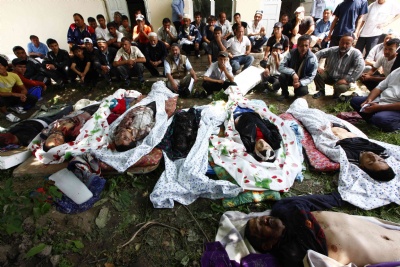
The official death toll from the clashes that began last week reached 117, with 1,500 injured, the Health Ministry of the beleaguered former Soviet country, which hosts US and Russian military bases, announced early on Monday. But an Uzbek leader claimed that 200 Uzbeks have already been buried, and the International Committee of the Red Cross has said its delegates witnessed about 100 bodies being buried in just one cemetery.
Jallahitdin Jalilatdinov, who heads the Uzbek National Center, also told The Associated Press on Monday that at least 100,000 had fled for the border and were awaiting entry into Uzbekistan. An Associated Press reporter saw at least hundreds of Uzbek refugees stuck at a border crossing near Jalal-Abad in no-man's-land between the boundaries.
The interim government, which took over after Kurmanbek Bakiyev was ousted by a public revolt in April, has been unable to stop the violence and accused Bakiyev's family of instigating it. Uzbeks have backed the interim government, while many Kyrgyz in the south have supported the toppled president. New fires raged Monday across Osh -- the country's second-largest city, on the border with Uzbekistan, where food and water were becoming scarce. Armed looters smashed stores, stealing everything from televisions to food.
In the mainly Uzbek district of Aravanskoe, an area formerly brimming with shops and restaurants, entire streets have been burned to the ground. In one still smoldering building, an Associated Press photographer saw the charred bodies of three people burned to death.
Despite military patrols, sporadic gunfire could be heard across the city. It was unclear who was shooting. No police could be seen on the streets, though authorities insisted some of the improvised checkpoints dotted around the city of 250,000 were theirs. Cars stolen from ethnic Uzbeks raced around the city, most crowded with young Kyrgyz wielding sharpened sticks, axes and metal rods.
In some parts of Osh, Kyrgyz residents protected homes housing both Kyrgyz and Uzbeks. In another city beset by violence, Jalal-Abad, about 25 miles (40 kilometers) away, armed Kyrgyz amassed at the central square. Their goal was to travel to the nearby Uzbek settlement of Suzak in search of an Uzbek community leader they blame for starting the trouble. As the clashes continued, desperately needed aid began trickling into the south. Several planes arrived at Osh airport loaded with tons of urgently needed medical supplies from the World Health Organization. Trucks carried the supplies into the city center accompanied by tank and trailed by an armored personnel carrier. Flights were canceled to Osh and Jalal-Abad, though at least one regularly scheduled flight landed in the city, carrying acting deputy Prime Minister Omurbek Tekebayev. The Uzbek border is just 3 miles (5 kilometers) from Osh. Uzbek refugees were mostly elderly people, women and children, with younger men staying behind to defend their property. Some were fired on as they fled.
The United States, Russia and the U.N. chief all expressed alarm about the scale of the violence and discussed how to help the refugees. The US and Russia both have military bases in northern Kyrgyzstan, away from the rioting. Russia sent in an extra battalion to protect its air base.
The US Manas air base in Bishkek is a crucial supply hub for the coalition fighting the Taliban in Afghanistan. Manas was working with the US State Department and interim government to help deliver food and medical supplies, said Air Force Maj. John A. Elolf, a spokesman at the base.
Uzbeks make up 15 percent of Kygryzstan's 5 million people, but in the south their numbers rival ethnic Kyrgyz. The fertile Ferghana Valley where Osh and Jalal-Abad are located once belonged to a single feudal lord, but it was split by Soviet dictator Josef Stalin among Uzbekistan, Kyrgyzstan and Tajikistan, rekindling old rivalries.
Turkey has said it will send two planes to evacuate Turkish citizens as ethnic rioting escalated in the southern Kyrgyz city of Osh, also threatening the security of Turks living in the region. Turkish Foreign Minister Ahmet Davutoğlu told a news conference on Monday that Turkey would send two airplanes to Kyrgyzstan to evacuate Turkish citizens in Osh and Jalal-Abad. This was confirmed in a statement by Turkey's embassy in Bishkek although officials did not provide details of where the planes will land. Turkish nationals and ethnic Turks are concerned for their safety and have repeatedly demanded protection from Turkey as mobs of Kyrgyz men continue to loot and set houses on fire. The Turkish Red Crescent is also expected to send emergency aid and medical supplies to the region. A statement released by the relief organization on Monday said they had established a crisis center and received information from the Kyrgyz Red Crescent regarding the situation of people in the region. The organization was expected to send food, medicine and medical equipment in a cargo plane along with a humanitarian aid delegation to Osh on Monday.














